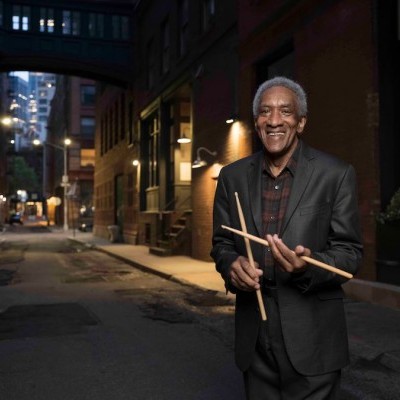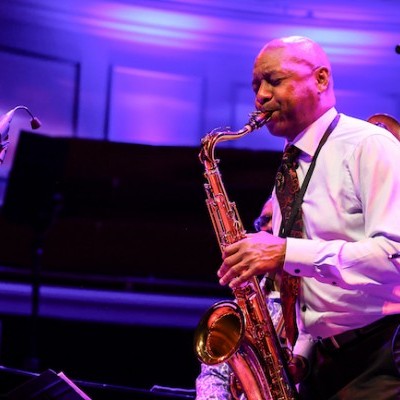Jun 3, 2025 11:25 AM
In Memoriam: Al Foster, 1943–2025
Al Foster, a drummer regarded for his fluency across the bebop, post-bop and funk/fusion lineages of jazz, died May 28…

Geri Allen (1957–2017)
(Photo: Courtesy Motéma)Geri Allen, a pianist, composer and educator with boundless technical facility and a far-reaching vision of jazz, died June 27 in Philadelphia. She was 60. Allen’s death was confirmed by her publicist, Maureen McFadden, who said the cause was cancer.
Throughout a career spanning more than 35 years, Allen, a proud native of Detroit, contributed lasting gifts to the language of jazz and its recorded history. Her style, as documented on nearly 20 albums as a leader or co-leader, was eclectic, merging strains from early 20th-century swing, bebop, mid-century modern jazz and even the avant-garde. Cerebral yet emotionally accessible, it was a brand of jazz that won over fans as well as critics. While exploring diverse musical avenues, Allen maintained an aesthetic that was steeped in the African American folk tradition.
Allen began taking lessons at age 7 and started her early music education under the mentorship of trumpeter Marcus Belgrave at the Cass Technical High School. In 1979, she was one of the first to graduate from Howard University with a bachelor of arts degree in jazz studies. It was there that she began to embrace music from all cultures that would ultimately influence her work. During that time, she studied with Kenny Barron.
“I first met Geri when she was a student at Howard,” Barron said. “She would take the train up to my house in Brooklyn for lessons. Even then it was apparent that Geri heard some things musically that others did not. In 1994 we performed a duo piano concert at the Caramoor Festival in New York and I realized how fearless she was and at the same time how focused she was. It was a lesson that I took to heart. Geri is not only a great musician, composer and pianist, she is a giant and will be sorely missed.”
Allen arrived in New York City in 1982, having completed a master’s degree in ethnomusicology at the University of Pittsburgh. Her recordings from this era find the pianist alongside numerous important innovators, including reedist Oliver Lake (with whom she recorded Expandable Language on the Black Saint label in 1984), tenor saxophonist Frank Lowe (1984’s Decision In Paradise), vocalist Betty Carter (1990’s Grammy-nominated Droppin’ Things), bandleader Dewey Redman (1989’s Living On The Edge) and saxophonist Steve Coleman.
It was with Coleman and another close associate, Greg Osby, that Allen would make a name for herself as an affiliated member of the M-Base Collective, which sought to promulgate new ways of thinking about and creating improvised music. Through the mid-1980s, she would go on to release four albums with Coleman, including three as part of the saxophonist’s cutting-edge Five Elements ensemble.
Allen also forged a strong bond with bassist Charlie Haden, with whom she recorded two live albums at the Montreal Jazz Festival in 1989, one of which was a trio set with drummer Paul Motian. (This group would reconvene later that year for a pair of trio albums on the JMT label.)
During her career, Allen also collaborated with Ornette Coleman, Charles Lloyd, Joe Lovano, Jason Moran and Vijay Iyer.
Allen was a determined bandleader and composer, with an impressive discography as a leader and solo artist. Her first leader recording, The Printmakers, was recorded in 1984, when the pianist was 27, and featured drummer Andrew Cyrille and bassist Anthony Cox. She also recorded frequently with trumpeter Marcus Belgrave, who served as Allen’s mentor when the young pianist was growing up in Detroit.
Between 1990 and ’96, she released a string of albums for the Blue Note label, including 1994’s Twenty One, a trio project with bassist Ron Carter and drummer Tony Williams.
In her later years, Allen recorded primarily for the New York-based label Motéma, which released two solo albums (Flying Toward The Sound and A Child Is Born), as well as the Motown tribute project Grand River Crossings. In April 2016, the label released Perfection, featuring the trio of Allen, reedist David Murray and drummer Terri Lyne Carrington. Dubbed the MAC Power Trio, this group toured the United States and Europe in 2016.
In addition to her performing and recording roles, Allen was also a devoted educator. At the time of her death, she was serving as the Director of Jazz Studies at the University of Pittsburgh. She won a Guggenheim Fellowship in 2008 in recognition of her exceptional scholarship in the creative arts.
In 2011, Allen became the first recipient of the Soul Train Lady of Soul Award in Jazz and that same year was nominated for an NAACP Award for her Timeline, Tap Quartet Project. She was also the first woman—and youngest artist ever—to receive the Danish Jazzpar Prize.
At the 2013 Detroit Jazz Festival, journalist Ted Panken conducted a dual Blindfold Test with Allen and pianist Danilo Pérez. A condensed version was published in the December 2013 issue of DownBeat, and Allen’s comments reflected her deep understanding of jazz history and piano styles. Commenting on “Afternoon In Paris,” from I’m All Smiles, a 1984 duo album by pianists Hank Jones and Tommy Flanagan, Allen said: “You understand that there’s mastership here, and complete control of everything, this continuum somewhere between ancient and modern … . You can’t really tell how old or new [this track] is, because they always sounded so modern in everything they played.”
In an article that John Ephland wrote for the December 2011 issue of DownBeat, Allen discussed A Child Is Born, a holiday album. “My family is spiritually based,” she said, noting that one of her primary inspirations was her paternal grandfather, who was a Methodist minister. She added, “My pastor, Dr. William Howard, hugely impacted my musical and spiritual growth by warmly welcoming me into the church.”
A groundbreaker in the artistic and social sense, Allen served as an inspiration and icon for a generation of female artists who would follow in her footsteps. “Geri Allen was a huge inspiration to me,” said avant-garde pianist Algelica Sanchez. “I can’t believe she is gone and I know many will miss her. R.I.P. Geri.”
Other notable artists shared their condolences on social media. “As Geri Allen’s life continues to unfold, her eternal journey will be a constant act of indestructible creativity. … We’ll be with her all the way,” wrote saxophonist Wayne Shorter in light of her passing.
“Today is a heartbreaking day,” wrote bassist Christian McBride. “One of the most brilliant, creative artists of our time has transitioned. RIP to Ms. Geri Allen.”
Dr. Hankus Netsky, chair for contemporary improvisation and former chair of jazz studies at New England Conservatory (NEC), issued a statement that read, in part: “Like much of the musical world, New England Conservatory mourns the loss of pianist, scholar and educator Geri Allen, who taught at NEC in the early 1990s. A consummate musician in every respect, Geri was a gentle but demanding teacher who encouraged her students to broaden their listening, hone every aspect of their musical skills and develop their classical technique. She brought a serious diligence to everything she engaged in and championed a truly global perspective on the African American contribution to 20th-century music.”
Carrington, who performed with Allen in the MAC Power Trio and in the ACS trio (with bassist Esperanza Spalding), issued a statement: “The jazz community will never be the same with the loss of one of our geniuses, Geri Allen. Her virtuosity and musicality are unparalleled. … I will miss my sister and friend, but I am thankful for all of the music she made and all of the incredible experiences we had together for over 35 years. She is a true original—a one of kind—never to be forgotten. My heart mourns, but my spirit is filled with the gift of having known and learned from Geri Allen.” DB

Foster was truly a drummer to the stars, including Miles Davis, Sonny Rollins and Joe Henderson.
Jun 3, 2025 11:25 AM
Al Foster, a drummer regarded for his fluency across the bebop, post-bop and funk/fusion lineages of jazz, died May 28…

“Branford’s playing has steadily improved,” says younger brother Wynton Marsalis. “He’s just gotten more and more serious.”
May 20, 2025 11:58 AM
Branford Marsalis was on the road again. Coffee cup in hand, the saxophonist — sporting a gray hoodie and a look of…

“What did I want more of when I was this age?” Sasha Berliner asks when she’s in her teaching mode.
May 13, 2025 12:39 PM
Part of the jazz vibraphone conversation since her late teens, Sasha Berliner has long come across as a fully formed…

Roscoe Mitchell will receive a Lifetime Achievement award at this year’s Vision Festival.
May 27, 2025 6:21 PM
Arts for Art has announced the full lineup for the 2025 Vision Festival, which will run June 2–7 at Roulette…

Benny Benack III and his quartet took the Midwest Jazz Collective’s route for a test run this spring.
Jun 3, 2025 10:31 AM
The time and labor required to tour is, for many musicians, daunting at best and prohibitive at worst. It’s hardly…